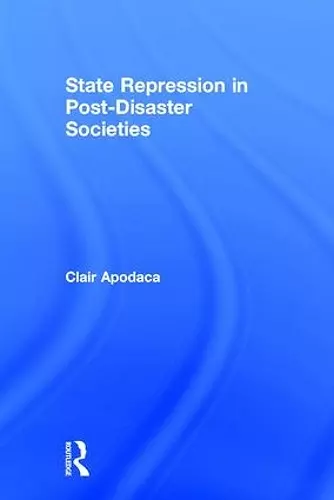State Repression in Post-Disaster Societies
Format:Hardback
Publisher:Taylor & Francis Ltd
Published:6th Feb '17
Currently unavailable, our supplier has not provided us a restock date
This hardback is available in another edition too:
- Paperback£44.99(9781138286092)

A natural hazard is a physical event but a disaster is a social and political phenomenon. Natural hazards are, for the most part, unavoidable and apolitical. However, they carry with them serious political, economic, and social consequences. Disasters also have adverse consequences on human rights standards. An understanding of the relationship between disasters and human rights outcomes requires knowledge of how disasters increase grievance and frustration, and impact the probability of contentious political behavior. To date, there has been little empirical or theoretical research on the specific circumstances under which disasters impact antigovernment political behavior, and even less is known of the causal chain between a natural disaster, protest activity, and human rights violations. In this book, Clair Apodaca maps a comprehensive causal model of the complex interactions between disasters and human rights violations. She claims that pre-existing inequalities and societal grievances turn a natural hazard into a disaster.
A grievance-based theory of protests suggests that the underlying structural causes are social and economic group disparities, political exclusion, along with population pressures. To turn these all too common conditions into active political behavior requires a triggering event. When a damage–loss is the primary consequence of a disaster, the government and international community can compensate victims by providing rebuilding and reconstruction aid. However, when the disaster results in high numbers of fatalities, the government and international community cannot adequately compensate survivors for their losses. Grievances cannot be easily or effectively eliminated, and survivors and their supporters mobilize for change even if they are likely to face state repression.
Clair Apodaca offers a unique contribution to our understanding of human rights violations. She effectively shows that there is a causal process between hazard events, protest activities, and government repression, a finding that is key to scholars, practitioners, and policy-makers working in this field.
'Clair Apodaca provides a fascinating account of the relationship between the natural world and the political world. As she painstakingly shows, natural disasters have had a profound effect on politics, especially in non-democratic states. In some instances this has led to the overthrow of the old order. However, at other times the government has responded to the public dissatisfaction of its response with even more repression. As climate change increases, the book’s timing could not be better – nor its message more important.' - Mark Gibney, Carol G. Belk Distinguished Professor in Humanities, University of North Carolina Asheville
'When natural disasters strike, the world’s attention becomes focused on the human tragedy that ensues, and the international community mobilizes to get emergency relief to the affected areas. All too often, though, the TV cameras leave, sympathy fatigue sets in, and the world’s attention shifts to the next crisis, leaving the victims to rebuild at best they can. Clair Apodaca shines a light on one troubling phenomenon that occurs in the aftermath of some of these events: the rise in repression and human rights violations by the government of the affected nation. Apodaca painstakingly traces out a causal process by which dissident movements can arise in the aftermath of natural disasters, the types of regimes under which such movements are likely to arise, and how, when faced with such challenges, which regime types are likely to respond with repression rather than some form of accommodation. Her analysis reveals that NGOs play a crucial role in this process by enabling affected populations in solving the collective action problems that, amid the conditions of a natural disaster, would otherwise preclude social movements by those most affected by the disaster but least served by the emergency aid from the international community. The story is compelling and the empirical tests are rigorous and convincing. This is an important work that creates an intersection between such diverse fields as human rights and state repression, social movements, and emergency management.' - T. David Mason, Regents Professor and Johnie Christian Family Peace Professor, University of North Texas
ISBN: 9781138286085
Dimensions: unknown
Weight: 540g
192 pages